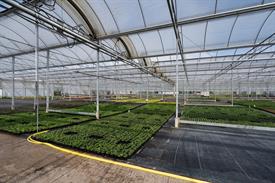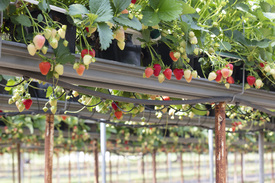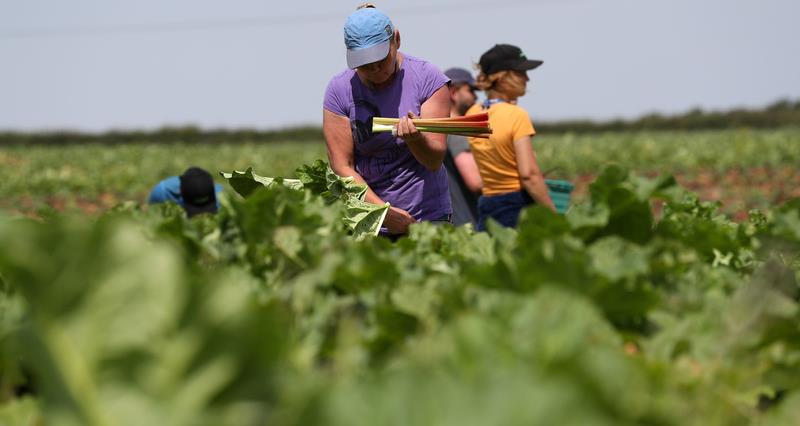The original strategy, first launched in 2023 and revised in 2024, attracted a lot of attention from the previous government and secured a number of important commitments in the No. 10 Farm to Fork summits in each year.
Now, under the Labour government’s 25-year Farming Roadmap, there is a renewed opportunity for policy makers to deliver on this ambition for growth by unlocking the 10 building blocks outlined in this strategy.
NFU Horticulture and Potatoes Board chair Martin Emmett said that the sector has enormous potential for growth which, with the right political and supply chain backing, growers are ready to deliver.
“For the UK to meet its food security and environmental targets, the government must act now to support the growth of domestic horticulture."
NFU Horticulture and Potatoes Board chair Martin Emmett
However, he warned that confidence in the sector was incredibly low, with growing burdens like cost inflation and unresolved critical policy decisions yet to be made post-election
10 building blocks for growing success
The NFU has identified ten critical building blocks that will be necessary for growers to develop and grow the industry:

1. Access to labour
A long-term commitment to the Seasonal Worker Scheme with a minimum five years notice of any scheme changes, with suitable length visas, and no unrealistic cap on worker numbers.

2. Access to affordable and sustainable energy supplies
Greater recognition of energy intensive horticulture sectors within current and future energy support schemes, and an expansion of grid infrastructure to support investment in renewables, and an increase of grid capacity to allow businesses to expand production.

3. Access to crop protection
An enabling crop protection policy which provides access to the plant protection tools the sector needs and ensures the UK is not disadvantaged against its global competitors.

4. Access to water
As the sector is vulnerable to drought and the challenges from reductions/revocations of abstraction licences, greater investment is needed in infrastructure to collect, store and distribute water both on farms and within and between regions.

5. Delivering environmental benefits
The government should review environmental schemes to make them more inclusive of horticultural production systems. Industry and government collaboration is needed to move towards peat-free in an environmentally and commercially sustainable way, with supportive legislation that promotes a level playing field.

6. Productivity investment
A replacement for the EU Fruit and Veg Aid Scheme which provides increased funding and sector-wide access, and no further delays in its development.

7. Enabling import controls for plants and plant products
Seek a renewed EU/UK SPS plant health agreement. In the meantime, minimise the barriers and costs for importing plants and plant materials – the foundations of all horticultural production – while maintaining high biosecurity and smooth trade flows.

8. Improving supply chain relationships
Address unfair trading behaviours through a statutory Horticulture Buyers’ Code of Practice. It is critical that growers can have open discussions and fair negotiations on all terms of trading negotiations, including price inflation, with their customers.

9. Farm assurance
A streamlined and effective farm assurance landscape that removes duplication and excessive cost burdens while delivering value and market needs.

10. An enabling planning policy
Glasshouses of all types should be exempt from biodiversity net gain, and there should be greater consistency in planning decisions to support – not restrict – horticultural businesses’ ability to grow.
Strong foundation
Commenting on the launch of the renewed strategy, NFU Horticulture and Potatoes Board chair Martin Emmett said: “Under the previous government, our horticulture strategy secured key commitments at the Farm to Fork summits.
“With the new government declaring in its manifesto that ‘food security is national security’ and placing growth at the heart of its economic strategy, there is now a good opportunity to align policy with these ambitions.
“Our revised strategy sets out the key government and supply chain policies needed to unlock the sector’s potential and drive the growth the government aims to achieve.
“Horticulture is a sector where industry, the supply chain, and government all agree there is significant potential for growth in the UK.
“However, since the election, progress has stalled, and growers urgently need clarity on crucial policies such as the Seasonal Worker Scheme, the Fruit & Veg Aid Scheme, and the output from last year’s Supply Chain Fairness Review.
“For the UK to meet its food security and environmental targets, the government must act now to support the growth of domestic horticulture.”
More from NFUonline:

Fresh produce contract regulations – have your say on draft proposals



